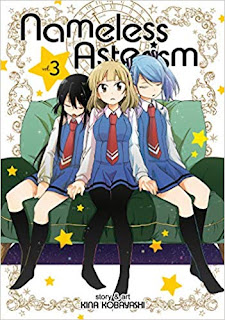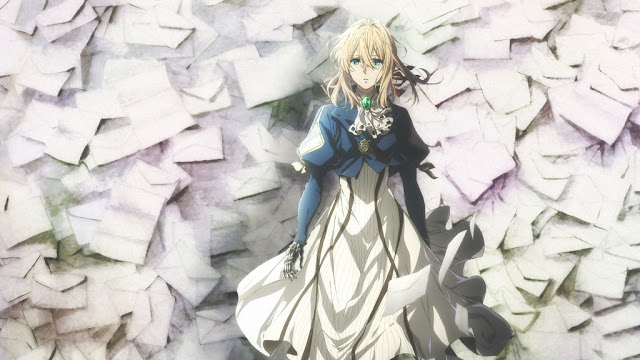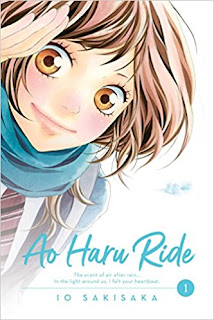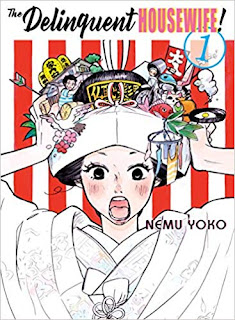I'm going to take
After the Rain vol. 1 by Jun Mayuzuki (published by
Vertical Comics) at face value until proven otherwise (we'll come back to this). And in light of that, it may be the best manga of 2018. It has everything I look for in a series. I don't give praise easily, and I was floored.
Let's start with the art, because I won't have to wade through any complex caveats there. I love realistic art where the character's limbs are impossibly long. I'm not a huge fan of cute or moe art styles which seem to have taken root in the genres I read most. I like the art in Hana-Kimi, Twinkle Stars, Utena and Nana for example. After the Rain's art is in that vein with long/tall characters but realism through and through.
Mayuzuki-sensei can show more emotion in her lead character's subtlest eye or mouth changes than most mangaka's can do with explicit text and screen toned hearts, flowers, explosions, and their facial features combined. One has only to look at the complexity of thought carried through just in the expression on the cover to see Mayuzuki's brilliance. So much is conveyed with such slight nuance. (Is she mad, angry, pouting, in love, happy, flirtatious?)
I don't know if this is Mayuzuki's style or that of the magazine this was printed in, but like many seinen manga, the use of screen tone is mostly relegated to shading and adding visual depth to each scene. It's done well here. I am, if you've been reading me at all, a fan of classically expressive shoujo style screentone use (lots of sparkles), which is absent here. However, that lack of glitter works here because the story is so subtly told, the pacing so delicate, the nuance so profound that to overuse screentones would take away from the realism of the scenes.
Additionally, her panel layouts are clean and simple. This is not art that gets in the way of the story or that demands immediate attention. Instead, it is precisely rendered, sensitive art in service of the mood of the story. Mayuzuki doesn't bring out the big art guns, but instead shows a deft touch with the pen, strong and consistent anatomy, and those incredibly expressive characterizations in her lead.
The story itself centers on second-year high-schooler, Akira Tachibana, the former track-team star, who retired after suffering a devastating ankle/lower leg injury (maybe tore an Achilles tendon or something). She works part-time in a family style restaurant. And she's in love with the manager. Who's 45. And balding. And not very good at his job. And sort of a push-over. And divorced with a young son. Living in a shithole apartment.
I will come back to that potentially very icky/male-gaze/fantasy setup momentarily, I promise, but remember, we're taking this at face value to start before we wade into the areas for potential concern.
Akira is one of the most simply complex or complexly simple characterizations I've seen in a long time in manga. It would be easy to reduce her to stereotypes at first blush: she's tall, long straight hair, good grades, athletic. Maybe she's haughty - after all, she doesn't speak a ton and people seem intimidated by her. Or do they?
What we actually get is a character who is generally liked, just quiet, not shy. She has friends from a range of backgrounds. Sometimes she goes out with them, sometimes not. She's normal without being manga-normal, as in: a ditzy cute can't-help-but-want-to-pet-her-head kind of depiction (thank god). She is sensitive to some people, oblivious to others, direct, and confident in herself without being aggressive. She's a balanced, strong, and real character.
Akira doesn't easily fit into any manga trope I've encountered. I keep returning to the word sensitive, as in Mayuzuki-sensei is sensitive in her handling of a character not just a collection of characteristics or tropes but as a fully rendered being. We like Akira not because she tugs on any particular heart string, or is a comic genius, or is a rough-and-tumble tom-boy, or clumsy, or any other cliche. We like her because she's pretty normal and put together but has feelings we find to be mirrors of our own.
So, great art and a great lead character. But what about the fact that we have a story whose setup consists of a 17-year-old girl being in love with a 45-year-old man? Is this just another seinen manga about male fantasy? Does she have daddy issues? Is she the victim of some terrible traumas and unmet childhood needs and using him in a futile attempt to fulfill herself at our voyeuristic expense?
I don't actually think so. I came in leery, I'm still a bit wary, but there was not a single damn thing in the entirety of this first volume to make me think that Mayuzuki-sensei will not continue to treat this story honestly at every turn.
It is possible, even in this age of increased awareness of predation and misogyny, and horrible power dynamics, that a young woman could be attracted to an older man and it not be awful (maybe). If we say we value a variety of narratives in literature, then we cannot insist that every narrative tells the "new" narrative, only the socially conscious or the traditionally marginalized narratives (which, don't get me wrong, we must tell and need many more of, by a more diverse group of creators as well).
But diversity doesn't mean going from all male-gaze narratives to all feminist narratives. And I'm not even sure that this isn't a feminist narrative anyway. Akira certainly seems to have agency at every turn. She has conversations with friends about things other than romance, she has complex emotions about things other than men (particularly watching her former teammates at track practice).
At face value, not as a standard-bearer for what is missing in literature, After the Rain's story is a possible narrative that could exist in the real world amongst the infinite variety of the human condition (My grandpa was 36 and my grandma 18 - and far better looking than he was!).
There are all types of attraction in the world and we cannot say categorically "no" to this one without risking censoring or limiting other types of love that diverge from traditional social norms (so long as we are conscious of whether there is an underlying power dynamic at play that disadvantages or removes agency from one party, particularly historically marginalized parties or ways of loving).
I sound like I'm doing back breaking contortions to justify an icky premise. In fact, what I mean to do is make it clear that sometimes we do back breaking contortions to find problems that don't actually exist because the superficial read is one that confirms our (perhaps valid) belief that the world is icky and out to get us (and sadly there has been so much to prove us right lately). But in After the Rain, despite the warning signs of the age difference, the text superbly handles a richly realized character and her feelings.
Akira genuinely seems to like her boss. Her boss is oblivious to her and certainly aware of how he comes across. But when she tells him she likes him, she doesn't dither, even when it doesn't get through the first time. Time will tell if Mayuzuki-sensei maintains the legitimacy or falls into a trauma-influenced understanding of why Akira is attracted to an older man. While that narrative may have validity too, I would be sad because her love appears to be something much more simple and universal and kind so far.
So through one volume, we have extraordinary art, a complex yet not overly dramatic lead character, and a beautiful, soft, burgeoning love story. We also get a sneak peak at the end to some needed complexity in the manager's character, a depth that may be what is speaking to Akira's soul even though neither realize it yet.
It was that glimpse that makes me so hopeful that what Mayuzuki-sensei captures with such graceful, quiet, beauty in this volume, can be sustained throughout the entire series. Whether they get together or not, whether Akira ultimately finds what she is looking for in him or not, whether it is a happy or a melancholy or just a bittersweet story, it appears as though Mayazuki-sensei has the capacity to tell an emotionally honest story about two people, even though on the surface it should raise our caution flags high.
But I love it so far. It let me with a soft glow. I can't wait for the next volume. I am so very hopeful for this story, even though I normally prefer yuri or classic shoujo and josei. The tone of this story is some of the finest art/writing combined this year in manga. It gets an 8/10 and it isn't higher only because I'm still nervous about whether the series will pull off the age-difference without reifying male power dynamics or treat trauma/daddy issues too lightly in the future. Let's hope After the Rain truly does become the landmark series it has the potential to be.
✩🚺












